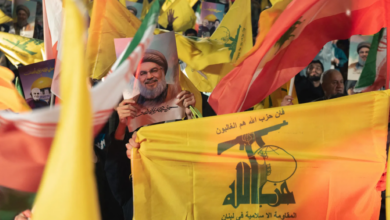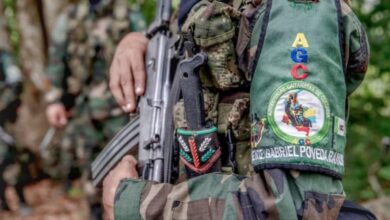Who Are ISIS K, the Culprits Of the Terrorist Attacks In Kabul?
This Terrorist Group Was Behind the Wave Of Attacks In the Capital Of Afghanistan That Caused Dozens Of Deaths.

The Taliban have de facto power in Afghanistan, yet control is still far from being achieved. Photo: DW
LatiAmerican Post | Santiago Gómez Hernández
Listen to this article
Leer en español: ¿Quiénes son los ISIS K, los responsables de los ataques terroristas en Kabul?
The Taliban have de facto power in Afghanistan, yet their control is far from absolute. On the ground, while Western forces complete the evacuation, there are also several armed groups independent of forces loyal to the Taliban and NATO soldiers. The most important of these is ISIS K, an offshoot loyal to the jihadist group, the Islamic State.
As it became known this weekend, they were in charge of detonating several bombs at the Kabul airport and in the surrounding areas. These bombs have left 170 dead, including 13 US soldiers who have already been transferred to the United States.
Also read: Infographic: A 40-Year Conflict, How the Afghanistan War Began
The presence of the Islamic State in Afghanistan is not new, in 2015 when it was more powerful than ever, ISIS K was founded in this region of Central Asia, according to intelligence entities. It is estimated that it currently has between 500 and 1,500 fighters (mostly Afghans, Pakistanis, Tajiks and Uzbeks), according to a United Nations report. And despite the fact that the US presence in the country has left great blows to this terrorist group that also operates in Pakistan, the regional branch of ISIS is quite active and operates outside the parameters or orders of the new Afghan government.
Despite the fact that during the civil war between extremist militias and the Government of Afghanistan (together with the West) the Taliban and the Islamic State functioned as allies, today the distance is greater. After the Taliban group signed a peace agreement with the Trump administration in Doha, Qatar, ISIS-K has harshly criticized the current government, calling them out on abandoning the jihad and being collaborators with the Americans.
However, not all bridges are broken. Both ISIS K and the Taliban are linked to the Haqqani network. The leader of this group, Khalil Haqqani, is now the head of security in Kabul.
Un posible futuro para Afganistán: el Talibán en conflicto con la filial afgana del Estado Islámico, ISIS-K (Khorazan), ambos tratando de controlar opio y litio, y de imponer su versión radical de la ley islámica.
Todo esto con miles de armas que EEUU deja en el terreno.
— León Krauze (@LeonKrauze) August 26, 2021
The underlying problem will not be discursive. Now that the Taliban will have to exercise control of the country and knowing that (apparently) they want to portray a more moderate rather than an extremist image, ISIS K can be a double-edged sword. If this terrorist group continues with its distrust of the current government, it could change sides and start a new civil war in the country.
Wasn't ISIS already defeated?
Despite the fact that the caliphate in Syria and Iraq has suffered great blows and is in retreat from what was its main center of operations, the "franchises" that they have been able to create in other countries both in Asia and in Africa have taken a greater role.
Just as the terrorist group that operates between Afghanistan and Pakistan is now more important, in Africa there are several jihadist groups that have pledged allegiance to the Islamic State and that continue to operate today. These are Boko Haram in Nigeria and Al Shabaab in Somalia. Although the latter has been a traditional ally of another terrorist group (Al Qaeda), in 2016, a faction of this Somali group changed its allegiance to the IS.
Biden's response
I’ve argued for many years that our mission should be narrowly focused on counterterrorism, not counterinsurgency or nation building. pic.twitter.com/UaObavqm8j
— President Biden (@POTUS) August 17, 2021
After the suicide attacks that left 13 US soldiers dead, Washington vowed to pursue those responsible: ISIS K. With the action of drones, the US forces were in charge of "eliminating" two members of the terrorist group.




